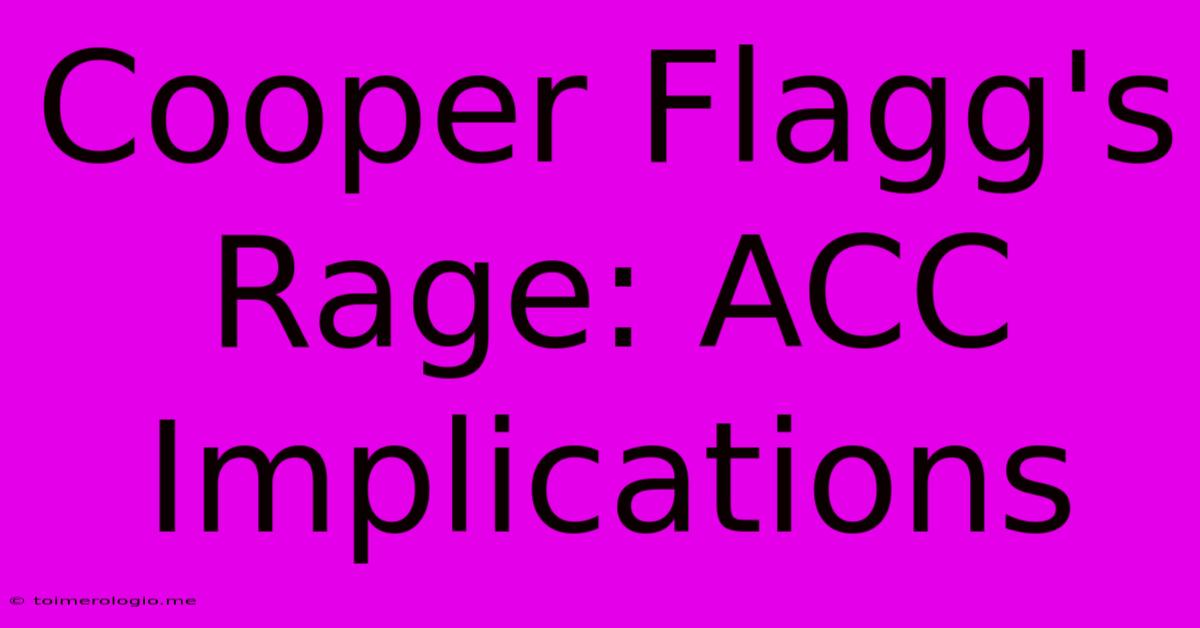Cooper Flagg's Rage: ACC Implications

Discover more detailed and exciting information on our website. Click the link below to start your adventure: Visit Best Website toimerologio.me. Don't miss out!
Table of Contents
Cooper Flagg's Rage: ACC Implications
Cooper Flagg. The name alone evokes excitement and anticipation in the college basketball world. This phenom, already touted as a potential number one NBA draft pick, has the basketball world buzzing, and his college decision holds significant implications for the Atlantic Coast Conference (ACC). His choice—wherever it may ultimately land—will dramatically shift the balance of power and reshape the conference landscape for years to come. Let's dive deep into the potential ripple effects of Flagg's choice, examining the implications for various ACC programs and the conference as a whole.
The Flagg Factor: Why He's So Important
Cooper Flagg isn't just another highly-ranked recruit; he's a generational talent. His skillset is remarkably advanced for his age, showcasing a blend of athleticism, scoring prowess, and exceptional court vision rarely seen in high school players. He’s not only a dominant scorer but also a phenomenal passer and rebounder for his position, making him a truly versatile player capable of impacting the game in numerous ways.
His presence would instantly elevate any program, injecting immediate star power and attracting other top recruits. This domino effect is precisely what makes his decision so crucial for the ACC. The conference is currently navigating a period of transition, with several powerhouse programs exploring departures. Flagg's commitment could be the game-changer needed to bolster the ACC's standing and attract future talent.
Potential Landing Spots and Their Transformations
Several ACC schools are considered frontrunners in the race to secure Flagg's commitment. Let's analyze how his presence would impact each:
1. Duke Blue Devils: Duke, a perennial powerhouse under Coach Scheyer, already boasts a strong recruiting pipeline. Adding Flagg would solidify their position as a national title contender for years to come, creating a dynasty-like atmosphere. His presence would further enhance Duke's already impressive recruiting appeal, attracting top talent and maintaining their dominance in the ACC.
2. North Carolina Tar Heels: After a season of rebuilding, North Carolina could use a player of Flagg's caliber to reignite their national championship aspirations. His arrival would instantly boost their recruiting profile and elevate their competitiveness within the ACC. The rivalry with Duke would intensify, creating even more excitement and national attention.
3. UConn Huskies (While technically Big East, worth mentioning due to proximity and recruiting battles): Although not technically in the ACC, UConn's proximity and their recent success make them a significant contender for Flagg. Landing him would be a major coup, solidifying their status as a national power and creating a significant recruiting advantage over ACC schools.
4. Other ACC Contenders: Schools like Gonzaga (while not ACC), Kentucky, and others are in the mix, and their acquisition of Flagg would drastically alter their team dynamics and recruiting outlook. For these programs, Flagg represents a chance to accelerate their rebuilding process or solidify their position at the top of college basketball.
The Broader Implications for the ACC
Beyond the individual programs, Flagg's decision will have profound consequences for the ACC as a whole. His commitment would:
-
Boost the conference's national profile: Landing a player of Flagg's caliber would generate significant media attention, putting the ACC back in the national spotlight. This increased visibility translates into greater recruiting opportunities and enhanced brand value.
-
Enhance recruiting efforts: Flagg's presence would serve as a powerful recruiting tool, attracting other top high school prospects to the conference. This domino effect could revitalize the ACC's talent pool and restore its competitiveness on a national level.
-
Increase television revenue: Increased national attention translates into higher television ratings and increased revenue for the ACC. This financial stability is critical for the conference's long-term sustainability and its ability to compete with other major conferences.
-
Improve the overall quality of play: The addition of a player like Flagg elevates the overall level of competition within the ACC, making each game more compelling and exciting for fans. This heightened competition benefits all teams, even those not directly competing for a national title.
The Risk Factor: What Could Go Wrong?
While Flagg's presence offers immense potential benefits, there's also a risk factor to consider. If he chooses a program outside the ACC, it would be a significant blow to the conference's prestige and recruiting efforts. This could further exacerbate the current instability within the ACC and reinforce concerns about its long-term competitiveness.
Furthermore, even if Flagg chooses an ACC school, there's no guarantee of immediate success. Team chemistry, coaching strategies, and injuries all play a role in determining a team's performance. While his talent is undeniable, he's still just one player.
Conclusion: A Defining Moment
Cooper Flagg's college decision is more than just a recruiting coup; it's a defining moment for the ACC. His choice will have far-reaching implications for the conference's standing, its recruiting efforts, and its long-term viability. The anticipation is palpable, and the impact will be felt for years to come. Whether he chooses Duke, North Carolina, or another program, the ripple effect of his decision will reshape the college basketball landscape, and particularly, the future of the ACC. The race is on, and the stakes are incredibly high.

Thank you for visiting our website wich cover about Cooper Flagg's Rage: ACC Implications. We hope the information provided has been useful to you. Feel free to contact us if you have any questions or need further assistance. See you next time and dont miss to bookmark.
Also read the following articles
| Article Title | Date |
|---|---|
| Influencer David Dobriks New Body | Jan 10, 2025 |
| Woods Witnesses Neighbors Home Fire | Jan 10, 2025 |
| Remembering The King At 90 | Jan 10, 2025 |
| The Last Showgirl Starring Pamela And Jamie Lee | Jan 10, 2025 |
| Celebrating Elvis A New Exhibit | Jan 10, 2025 |
